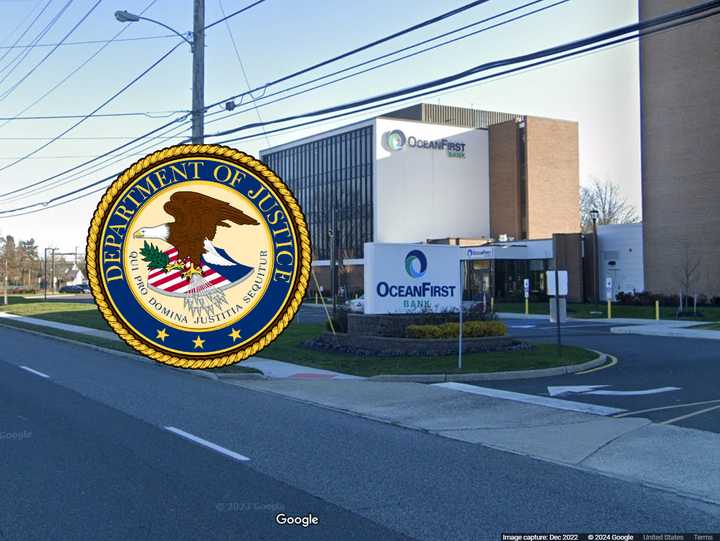OceanFirst Bank agreed to the settlement to resolve the accusations that date back to 2018, New Jersey's U.S. Attorney Philip Sellinger said in a news release. The Toms River-based bank was accused of redlining in predominantly non-white neighborhoods in Middlesex, Monmouth and Ocean counties.
The $15 million settlement came after the Department of Justice launched its Combating Redlining Initiative in October 2021, aiming to stop a "persistent form of discrimination against communities of color."
"This settlement, and the over $137 million in relief the Justice Department has secured for communities across the country, will help to ensure that future generations of Americans inherit a legacy of home ownership that they have been too often denied," Attorney General Merrick Garland said in a statement. "Redlining is unlawful, it is harmful, and it is wrong.
"The Justice Department will continue to hold banks and mortgage companies accountable for redlining and to secure relief for the communities that continue to be harmed by these discriminatory practices."
The DOJ's complaint was filed in federal court on Wednesday, Sept. 18. Prosecutors said OceanFirst Bank failed to provide mortgage lending services to predominantly Black, Hispanic, and Asian neighborhoods.
OceanFirst Bank was accused of discouraging people seeking credit in those communities from obtaining home loans. The bank disproportionately advertised and put branches in majority-white communities, while closing branches in mainly non-white neighborhoods.
The term "redlining" was created to describe the type of discrimination non-white homeowners faced when seeking federal government-insured mortgages during the Great Depression, according to Cornell University. The discrimination continued for decades despite protections passed into law during the Civil Rights Movement.
Under redlining, lenders have avoided providing credit services to people because of their race, color, or national origin.
“Redlining creates an unequal playing field that unfairly prevents many persons of color from achieving the American dream of home ownership, and this type of systemic and intentional discrimination cannot and will not be tolerated," Sellinger said in a statement. "It is wholly unacceptable that redlining persists into the 21st century, and we are committed to ensuring that all of our citizens have the chance to put down roots in their own home as this helps build stronger communities for all of us.
"This agreement is a major step forward in removing illegal and discriminatory barriers in residential mortgage lending in New Jersey.”
In the settlement, OceanFirst Bank said it'll invest at least $14 million in a loan subsidy fund to improve home mortgage access to the neighborhoods discriminated against in Middlesex, Monmouth, and Ocean counties. The bank also agreed to spend $1.1 million on advertising, credit counseling, and other forms of community outreach in those communities.
OceanFirst Bank must also open a loan production office and maintain its recently opened full-service branch in the affected neighborhoods. At least one mortgage loan officer needs to be assigned to each location.
The settlement requires OceanFirst to "conduct a community credit needs assessment, evaluate its fair lending compliance management systems, and conduct staff trainings on fair lending." The bank also agreed to hire a community lending director to oversee home mortgage lending in communities of color.
The DOJ said it has secured 13 resolutions under the Combating Redlining Initiative, which has expanded by working with states' U.S. Attorney offices.
"Far too often, communities of color have been denied equal access to credit and the opportunity to build generational wealth," said Kristen Clarke, Assistant Attorney General of the DOJ’s Civil Rights Division. "Through our historic efforts to combat modern-day redlining, we have opened up new homeownership opportunities for impacted families and communities. This agreement underscores the Justice Department’s commitment to holding banks and financial institutions accountable for their discriminatory actions while ensuring racial and economic justice for all Americans."
OceanFirst also agreed to its settlement with the Department of Housing and Urban Development.
"Redlining is not only illegal, but it unfairly closes doors of economic opportunity for thousands of families of color in this country," said HUD Acting Secretary Adrianne Todman. "Together with our partners at the Justice Department, HUD remains committed to enforcing the Fair Housing Act by rooting out all forms of discrimination in housing. Today’s announcement underscores our shared commitment to achieving justice and creating equitable opportunities for Americans, particularly those who have historically been denied access."
The federal court must approve the settlement terms after the DOJ resolved its claims against OceanFirst through a consent order.
Click here to follow Daily Voice Villas-Lower Township and receive free news updates.
